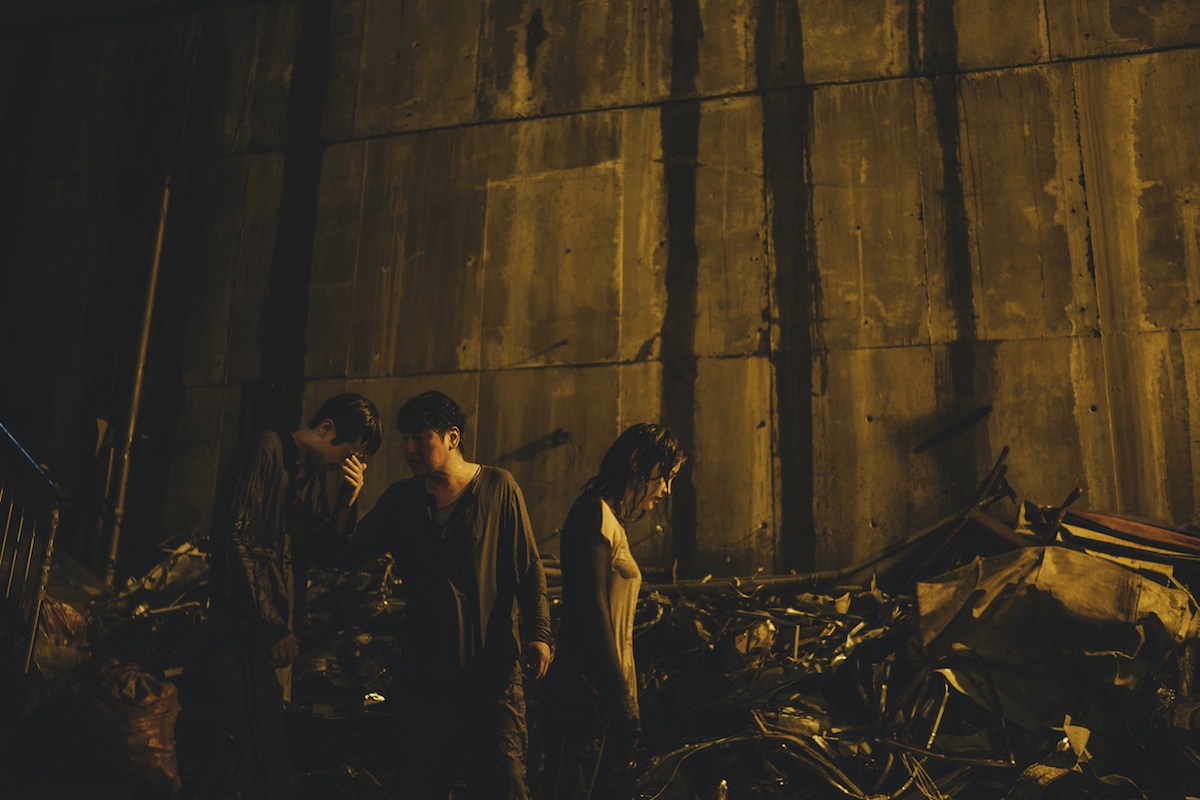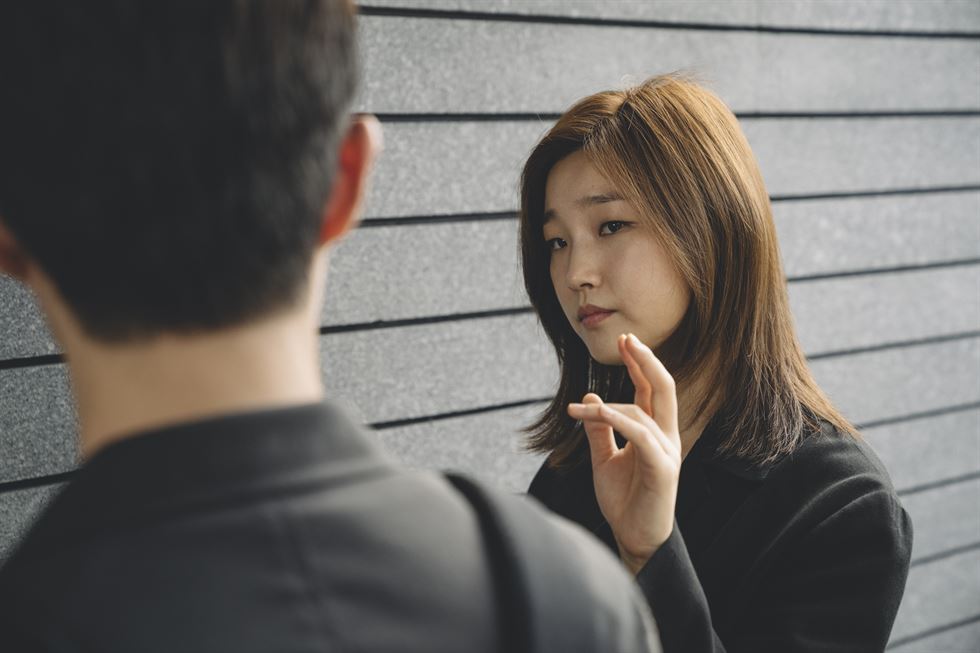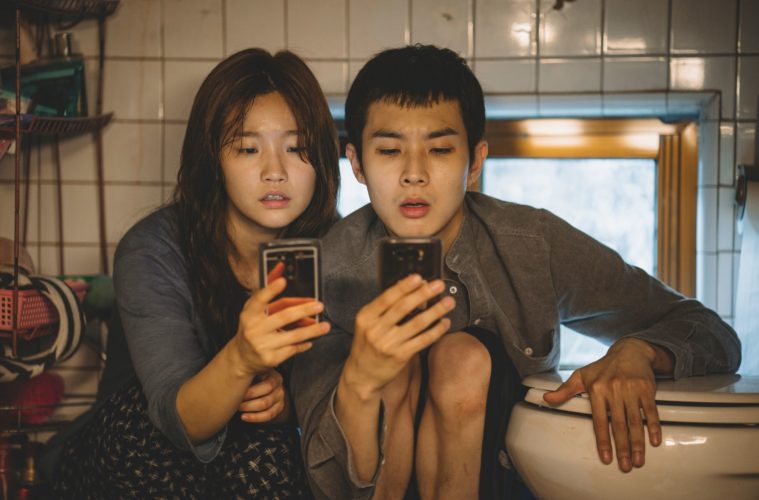Parasite is a film about families as much as it is about class resentment. As avatars of capitalism, the Parks and the Kims’ codependence sheds light on its systemic mutual toxicity. Yet just as compelling as the parasitic relationships in these families—and what they reveal about the greedy instincts that have been socially programmed into our psyches— is how the distinct nature of their intra-familial dynamics also speak to the larger social forces they exist within. In this light, director Bong Joon-ho is asking us to consider the extent to which capitalism itself cleaves or fortifies the bonds of familial love—suggesting that the greater the class resentment, the stronger the bond.
And strong are the Kim family ties indeed. Their scruffy and clamorous energy invokes a kinship that’s weathered its fair share of hardships, and whose resilience functions as a suit of armor against a ruthless and obscenely unequal social landscape. At the same time, the Kims’ place at the bottom rung of the economic ladder shouldn’t be taken as a lack of skill or talent on their part—we see, in fact, that Mrs. Kim used to be a prize-winning runner, not to mention brother Ki-woo’s university-level English proficiency and sister Ki-jung’s creative instincts (in addition to her surprising aptitude as an art tutor). The Kim siblings put these skills to good use when they are hired by the nouveau riche Parks, and their mix of competence and con-artistry humorously exposes the hollow fallacies of a credential-obsessed workforce (after all, who hasn’t been frustrated with the conundrum of needing experience to get a job, only to need that job to get experience?). Perhaps, Bong posits, the only way this impossible, maddening and rigged meritocratic cycle can be broken amidst a storm of dejection is by supplementing skill with sheer luck, steadfast resourcefulness, and savvy hustling.
Ki-woo and Ki-jung possess these qualities in spades—qualities that incidentally bear resemblance to the real-life professional trajectories of the young actors who play them: Choi Woo-shik and Park So-dam, respectively. Born in Seoul, Choi moved with his family to Canada at the age of 11, and as a young man, he set his sights on pursuing a career as a theater director. A friend of his suggested he try his hand at acting as a primer, though Choi faced his fair share of rejection. It wasn’t until he returned to Korea with his family 10 years later that his luck began to change, and soon enough he landed the first part he auditioned for, on the 2011 series The Duo. For the next 6 years, Choi would go on to act mostly in Korean television dramas, until a starring vehicle came along that cemented him as an actor to watch out for; 2014’s Set Me Free (directed by Kim Tae-yong), a gritty and tortured turn for which he won the Blue Dragon award, as well as Actor of the Year at the Busan International Film Festival. Parasite marks the 29-year-old’s second collaboration with Bong following 2017’s Okja, and his second collaboration with co-star Song Kang-ho following Yeon Sang-ho’s 2016’s zombie drama Train to Busan.
Park So-dam also saw her career take off following awards recognition, though it too was a bumpy road to get there. In 2004, she began acting in small roles here and there, facing 17 rejections before her big break came along in 2015’s The Black Priests; the tale of a schoolgirl’s demonic possession that won Park the Newcomer Prize at the 52nd Baeksang Arts Awards. The 28-year-old’s filmography has earned her the nickname “The Jewel of Indie Films” in her native South Korea—a filmography that like Choi, includes a previous collaboration with Mr. Song, in 2015’s The Throne, for which the two played husband and wife (!).
Here, Choi and Park—who like Ki-woo and Ki-jung, have an intimate understanding of what it’s like to take rejection with a grain of salt in a competitive labor market—reflect on how they became involved in Parasite, their on and off-screen relationship with “Papa” Song, and learning to navigate Korea’s strict culture of generational respect in preparation for this project.
How did you each come on board this project? Woo-shik, I read somewhere that you agreed to do Parasite before even knowing its premise? I imagine there was a lot of trust and good faith between you and Mr. Bong following Okja.
Choi: One day on the set of Okja, Bong came up to me and told me to “stay in shape.” Confused, I initially thought he meant for me to stay muscular, but he was actually telling me to maintain a thin frame. It didn’t occur to me that Bong had me in mind for another project. Even when he approached me with the offer to be in Parasite, I was never actually told whom I would be playing, or anything about the film’s story—I was instead only given a hint, and had to wait for the script. When I finally read it, I remember feeling like I had just gotten off a rollercoaster. I especially loved the dramatic tonal shifts, which are even more dramatic when you consider how most Korean films and shows are written.
So-dam, is it true you thought Mr. Bong was joking when he expressed interest in meeting you?
Park: When I was first approached for this project, I was going through a professional slump and didn’t have representation. I was in the middle of taking a yearlong break from acting, trying to figure out my career, when I received a text from Parasite’s costume designer telling me that Bong was interested in meeting me. At first I didn’t believe it, so much so that I don’t think I even replied to the text. When I finally did meet Bong for the first time, I remember him asking me why I was so suspicious and couldn’t just trust people when they say they want to meet me. [Chuckles.]
Woo-shik, you briefly touched on your initial reaction to the script. Can you both elaborate on what it was like to go into a story like this blindly? As you were reading, what came to mind in terms of how you would navigate the film’s curveballs, tonal shifts, and individual character arcs?
Choi: You know those moments where you say to yourself, “Okay, I have to do this”—kind of like a pep talk? At first I didn’t realize Ki-woo played such a big role within the family, and I had to try to make [pauses]—okay, in Korean culture, younger generations have to be really polite to their elders, almost to the point where the politeness becomes uncomfortable. For this reason, it’s often really difficult for younger Koreans to approach older generations, and preparing to play Ki-woo meant learning how to break down those barriers in order to flesh out the character with Song, and our father/son relationship. Thankfully, it actually wasn’t very difficult, because in Korea, there are no trailers on movie sets, and actors are grouped into one green room. So we would just stay in the same room, bonding and developing our characters together over casual drinks, like a family. Every time I came across a problem or question in the script, Song Kang-ho was right there to give me advice, and I think that worked well.
Park: The script’s speed and the fast-paced velocity of its different scenarios were definitely most impressive, but the tonal shifts also felt very true to life for me. Life isn’t just a comedy or a single genre, and you really don’t know what’s going to happen in the next five minutes. This is why Parasite’s story felt very life-like, and I really wanted to talk with the other actors to discuss how they felt about it. I was also eager to discuss the film with audiences, to learn what their experience with the story was, and what they thought after watching it.

What’s it like to work with an actor like Song? To what extent did acting with him inform your own craft?
Park: Song and I had previously worked together on a film called The Throne. In fact, we played a married couple with two kids together! [Laughs] Our characters actually had a very deep relationship, and I remember how amazing it was getting to learn from Song first-hand. He made it clear that he wanted me to continue acting, to get more work and further develop my craft and individuality. To be honest, The Throne didn’t provide much opportunity for us to bond one-on-one with eye contact, due to the mandates of the script and the lack of time we had together on set. But with Parasite, we were able to make a lot of eye contact during most of its shooting, and it all felt so unreal and cathartic. Just seeing him as a three-dimensional person standing in front of me in real life was unreal. The way Song acts, no two takes are ever the same. He always brings something different, and I saw how he experiments and tries everything out even in a single scene, which was very professional and something I looked up to.
Woo-shik, you and Song previously worked together on Train to Busan, and I’m curious how that experience informed your collaboration in Parasite. How did your dynamic as screen partners evolve, and what did you learn from him as an actor?
Choi: Even now, So-dam and I still call Song our papa. We’ll call him on the phone and say, “Papa, did you have dinner?” [Both chuckle.] As I said, in Korea it’s really difficult to establish inter-generational relationships, because of cultural age differences and the social code that requires unconditional respect towards one’s elders. But Song is really genuine, and not at all strict with these customs. For him, it’s all about the acting, and he really cares about younger Koreans succeeding. Parasite was the ultimate lesson in acting [chuckles]—just by being there with him I learned more on set than I would from any drama school.
Was there any improvisation in the film? Song and I discussed his affinity for improv, so I’m wondering if there were moments where Bong gave you freer reign to experiment with the script?
Choi: Bong wasn’t particularly strict with the script, but once on set, we realized that we didn’t really need to improvise, because the storyboard was so compact that doing anything extra was unnecessary. But even if that had not been the case, Bong wouldn’t have minded that looseness.
Park: I agree with Woo-shik, I found that I didn’t need to improvise anything because of how tight the storyboard was. Bong made it clear that we could have that creative freedom, but every take, detail, conversation, and sentence was so meticulously built into the storyboard that it wasn’t even necessary.

What do you want audiences to know about the Kim family, specifically Ki-woo and Ki-jung?
Choi: Parasite presents very different social classes. There’s a lot of poverty and problems suffered by the Kim family, but their lack of economic security doesn’t stop them from really loving and caring for each other. Yes, we do commit some cons, but they are done in the best interest of the family’s survival. Ki-woo’s family is really loving and always positive. [Chuckles.] And they don’t really think that much about their actions. [Laughs.] I mean, they think about them, but that guilty conscious isn’t quite there, because they don’t really see their actions as “bad” if they’re necessary.
Park: You see that my brother in the film Ki-woo, doesn’t even have his own room and instead sleeps in the living room. I really feel that even if the Kim family had lived in that small basement house all their lives, they’d never be the ones to complain about their situation, or compare themselves to other people. They’re happy with what they have, and don’t think they should necessarily feel bad or ashamed about where they fall within society’s economic scale. I strongly believe that mentally, they’re very independent and healthy. When they first walk into the wealthy Park household, for example, they don’t think, “Wow, we have to be that way, like them.” Rather, it’s more like; “They’re the Parks and we’re the Kims, and we’re very different from each other. It’s not necessarily bad or good, just different.” In that way, I feel like the Kims are much more mentally healthy and emotionally wealthy than you would expect them to be.
How has the film been received in Korea? Have Korean audiences embraced its social themes, and how do you hope Parasite resonates on a global scale?
Choi: Because Parasite takes place in Korean society, and is told through the lens of the country’s distinct social dynamics, I thought, “Would non-Korean audiences understand these cultural differences?” It turns out, most of the film’s problems and messages actually represent global issues, so people just understand and embrace it. However, there were some small differences among audience reactions in Korea relative to other countries. Native speakers, for instance, understand the film’s wordplays since many Korean dark comedies heavily toy with similar wordplay, but about 5 percent of those nuances are lost in the translated subtitles. Still, there’s a global recognition and understanding to the movie’s ideas, which is why I want people to come and enjoy it for themselves. On an individual level, people will respond differently to the various messages it communicates, so it’s exciting to think about the conversations Parasite will inspire for those who see it.
Park: I don’t think there’s one specific message or emotion that everyone should feel as a cohesive group, it’s more about everyone relating to certain parts that feel true to their own life. Like I said, I couldn’t wait for people to watch it and talk about it, so I actually went on my own the day it was released in Korea—I paid for a ticket and everything. [Chuckles.] On my way out, I could hear audiences chat about how they felt, and everything they couldn’t wait to discuss. It was then I knew we had something special, and I felt deeply proud to be a part of it.
Parasite is now in wide release.

